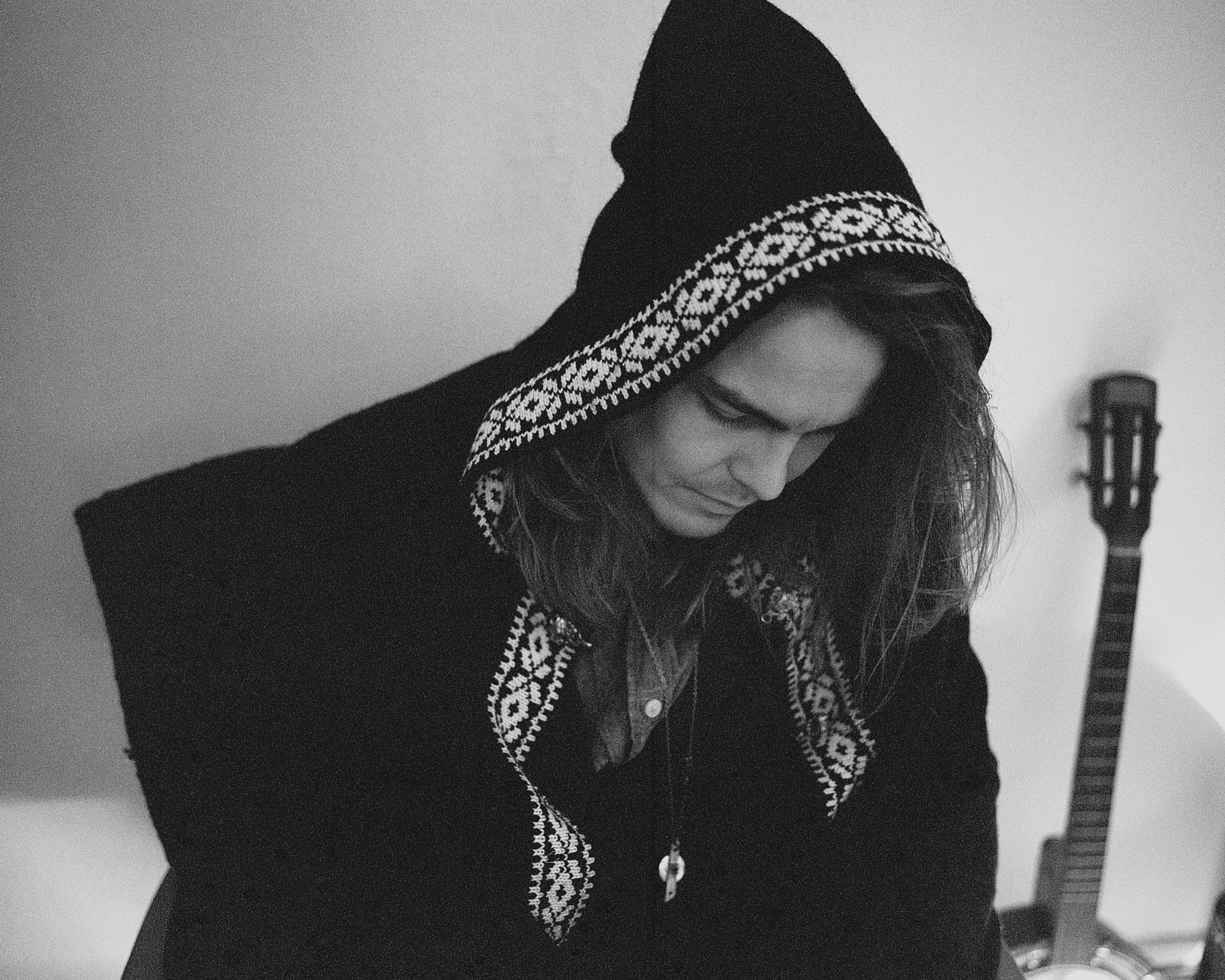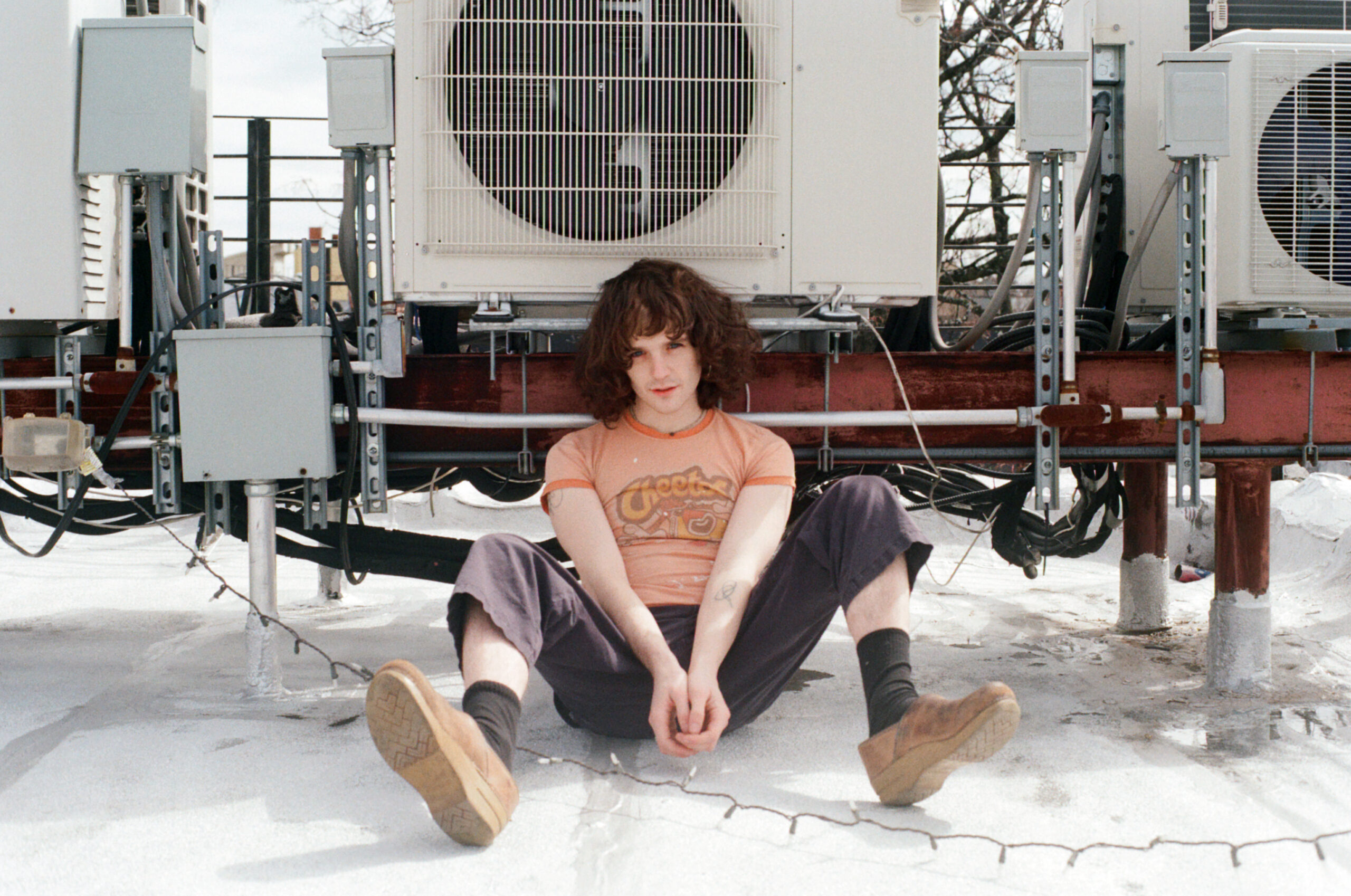Ask almost any musician and you’ll get the same answer: Making albums is hard work. From the creative side, wrangling the abstract forms and ideas of music into a tangible presence, to all the technical aftermath, like the long list of minute tweaks that make a record sound good and correct, a lot of exertion goes into a solid finished product. That’s before you get to outside pressures, like the idea of releasing a debut, or a first solo album, oryour first release after some time away. So when Finnish musician Mikko Joensuu eventually decided he was making his solo debut via not one, but three connected albums, you might be able to forgive any friends and family who were dubious or thought he was, well, a bit crazy.
"I never actually thought they’d be records at all. I didn’t plan on releasing them in any form," Joensuu says of the resulting Amen trilogy, which saw staggered release in Europe from June 2016 through June of this year and which is just now officially available in America. Calling from his home in Helsinki, Joensuu details the long journey and personal upheaval that yielded all his new solo work.
In his 20s, Joensuu’s life was dominated by dual struggles. After forming a band, Joensuu 1685, with his brother and releasing an album in 2008 to some buzz in Europe, Joensuu found himself in a prolonged period of depression and anxiety. He stopped playing in that band by 2011, and while seeking what was next he also reckoned with his religious upbringing and a loss of faith. Each of the Amen records represents a chapter in that story, using different aesthetics and songwriting approaches to capture the arc of Joensuu's life.
Before moving to Helsinki at 19, Joensuu grew up further north in Finland, surrounded by forests and farms. "There’s not much there, but it's still under the rules of civilization," he recalls, laughing. His family were devout Pentecostal Christians, and as a younger man, Joensuu was a fervent believer, too. "I truly embraced Jesus and God. As a child, I thought the concept was as real as any people are," Joensuu says. "There was no question about that for me." But moving to Helsinki started a period of time where questions did start to appear, where the distance Joensuu had started to feel from Christianity turned into him grappling with what he really believed.
"I felt like I had to be honest with myself, that this was not a small question where I can say, 'Maybe, maybe not,'" Joensuu says. "That started something that lasted for many years."
The writing of the Amen records reaches all the way back to 2008, when Joensuu 1685 was still active. Then, the songs were simply other outlets for Joensuu, during the time he had no plans to release any of it. In early 2013, he realized he was writing for three separate albums that each "had a different kind of color in them" with the connective theme of "evolving emotion." Coincidentally, it was around that same time that Joensuu finally walked away from the faith of his youth.
Writing the Amen trilogy was perhaps what allowed him to reach that answer for himself, to find that peace. "I think I wrote songs about it before I could actually admit to myself that there’s nothing I believe in [Christianity]," Joensuu says. "I had already started to write about the chaos of the religion... but when you grow up around these ideas and it becomes a part of you... it's hard to say that some part of it doesn't exist." The final, hardest part for Joensuu was letting go of his perception of Jesus -- a strain of Evangelical Protestantism, Pentecostalism accentuates the image of Jesus as the loving "brother and father," as Joensuu puts it. In that light, Christ becomes a source of the religion's warmth you can directly interact with. Eventually, Joensuu had to decide he no longer believed in that, either.
https://youtube.com/watch?v=bGbQgEwkzSw
On Amen 1, Joensuu sounds grief-stricken, at a pained crossroads. The album is simultaneously stark and lush in its mourning, with Joensuu mostly writing wintry, ghostly Americana and augmenting the compositions with strings and pedal steel. A sense of loss is palpable across the record, as is a sort of numbing sadness. It's there, in the beginning of the arc, where you can hear Joensuu's period of depression, as well as his searching and questioning. This was the crisis-of-faith moment, not yet the loss-of-faith moment. But Joensuu points out that's not all that went into the record, despite titles like "I'd Give You All," "Take Me Home Oh Lord," and "Closer My God," in which Joensuu sings, "I wasbaptized in blood/ But I'm not sure to whom it belongs." (Joensuu doesn't remember writing that song. "I was on some medication," he explains. "I have some memory blocks from that time.")"I’m not exactly singing about God," he says. "Things like sin or the devil are more familiar metaphors for me to contemplate the state I’m in... which wasn’t really good."
Amen 2, in comparison, is "relief music" by Joensuu’s estimation. And, indeed, even though opener “Drop Me Down” has a strung-out, Spiritualized-esque quality to it, the climactic build of it lets you know Amen 2 is where Joensuu found catharsis. "Drop Me Down" begins in quiet lament and gradually erupts into noise-gospel, Joensuu singing, “Oh God won’t you drop me down/ I didn’t make a sound/ When you dropped me down," before currents of distortion overwhelm the track. It’s a gorgeous, moving piece of work, and it's indicative of Amen 2 overall: noisier and stormier than Amen 1, but in a way that conveys release, not darkness. "At times, it was bursting out like moments of pure joy after seeing through a cloud for a long time," Joensuu suggests.
Though the beginning of the album is strong, with "Drop Me Down" leading into similarly evocative songs like "Dying Rain" and "What Have I Done," the standout -- and perhaps the best song on any of the Amen albums -- is the 11-minute epic "There Used To Be A Darkness." The song begins with a programmed beat from a '70s drum machine and whirring, clattering noises that coalesce into a rush as Joensuu proclaims, "You're gonna have to burn if you wanna feel free/ There used to be a darkness in my heart/ But it ain't there no more." The "song" part, so to speak, only lasts for about two and a half minutes, before the track rides out on different passages of synths and noise and that insistent beat. The title makes it plain enough. "There Used To Be A Darkness" is at times both joyous and haunting, the sound of a man purging himself of his demons and shaking loose the baggage of his past.
Amen 3 concludes the whole saga with a sense of resolution after the crucible of Amen 2. The third album of the collection is the most experimental; several tracks are ambient electronic works that stretch well beyond the 10-minute mark. Long running times are common on Amen 2 as well, but those songs grew and thrashed in different ways; on Amen 3, there’s a serenity. Ironically, or perhaps logically, Joensuu winds up presenting his loss of faith via a kind of religious narrative: Amen 3 is the moment of transcendence, Joensuu often subsumed in the celestial patterns of oscillating synths.
"It was more like trying to stay next to the music as freely as I could and see where it goes," Joensuu says of writing the Amen 3 material compared to the other two. "In many ways, it was me forgetting all the things I'm used to doing."
The album -- and the whole trilogy -- ends with "Pearly Gates." Beginning as a fragile acoustic track, it musically marks a return to the more organic territory of Amen 1 at first. But by the end of its 13 and a half minutes, "Pearly Gates" serves as both stylistic and thematic coda to the entire Amen story. Atmospheric tension crests into an intensifying song the same was as many of Amen 2’s best moments do. Its dramatic conclusion holds both the darkness of Amen 1 and the transcendence present on the rest of Amen 3. It's a stunning piece of work to conclude a stunning trilogy.
Its placement on the end of Amen 3 ties everything together but also underlines how a lot of this material, though often completely disparate sonically and seemingly written from entirely different states of mind, originated in tandem. Listeningto the Amen trilogy all the way through takes you on the same journey Joensuu underwent, but along the way there are twists, near left turns, punctuations of doubt aimed in many directions and serving as reminders that no narrative arc or resolution or conclusion is ever that neat. Joensuu describes "Pearly Gates" as being addressed to God, in a way, Joensuu saying he's through with the process. Placing the song at the end was a plan that had been in Joensuu's mind for a while, precisely for how it was a callback that also lent finality. "[All the songs] are part of the same story," he says. "I'm still the same person that was in the first songs."
A project that spanned nearly 10 years, serving as the vehicle through which Joensuu overcame his period of depression and flew headlong into grappling with faith, also now lives on as an aural representation of those feelings and thoughts -- a catalog of the strife. That makes the Amen trilogy a heavy piece of work, for sure, but one that is so rich with detail and emotion that it more than makes good on the demands it has for listeners. But what about the guy who made it? After completing a project like that, all these years later, where does Joensuu go next?
"I think the main feeling is that I can finally start making music," he says with a laugh. Finishing the Amen albums functioned as proof to himself: proof that writing music is what he needed and wanted to do with his life. It was almost the final burden he had to lift, getting these themes out of himself through these specific three albums. Now, he can follow whatever muse appears. "Now that I've finished something I started eight or nine years ago," Joensuu begins, "it’s a relief to sit at an empty table and just ask myself: What is the song I would like to hear now?"






